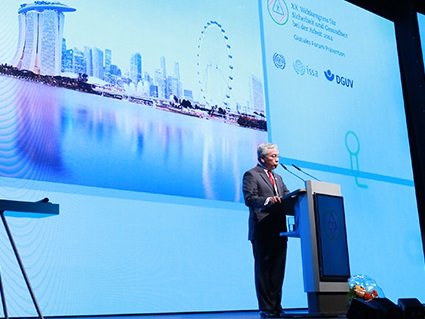 One person dies every 43 seconds from work-related cancer, new global research has revealed.
One person dies every 43 seconds from work-related cancer, new global research has revealed.
The figures for occupational cancer were highlighted at the World Congress on Safety and Health at Work in Singapore.
Across the world, an estimated 742,000 people die annually from cancer which is linked to work activities. This is nearly double the number of deaths in workplace accidents.
Cancer-causing carcinogens include diesel fumes, silica dust and asbestos. Additionally, exposure to the sun’s rays is also a major risk for outdoor workers.
The new research was carried out by the International Labour Organization, ministries in Finland and Singapore, the Workplace Safety and Health Institute in Singapore, the Finnish Institute of Occupational Health, the International Commission on Occupational Health and the European Occupational Safety and Health Agency.
Better data
Previous estimates had put the number at around 666,000 people dying each year from work-related cancer. The updated data is based on better gathering and analysis by the research consortium.
The group found 2.78 million work-related deaths occur every year worldwide. More than 380,000 are fatal accidents with 2.4 million the result of occupational diseases, including cancer.
Revealing the findings, Dr Jukka Takala, from the Workplace Safety and Health Institute, said: “It is tragic that so many people are losing their lives because of exposure to carcinogens at work. The total is far higher than those killed in workplace accidents.
“Now we have revealed these research findings, we need to look at how we can reduce this figure and save lives. There are many cost-effective ways that organisations can protect staff from exposure. Now is the time for action. People should be able to do their work without being put at risk.”
No time to lose
The figures follow IOSH’s ‘no time to lose’ campaign to which more than 100 organisations have pledged since its launch in November 2014.
This campaign aims to reduce worker exposure to carcinogens and also has an additional 200 supporting organisations.
Graham Parker, president of IOSH, said: “The findings from this new research are truly shocking. It shows that 742,000 families are having to come to terms with the loss of a loved one through cancer caused by something they were exposed to at work.
“What makes it even more shocking is the fact that these deaths are preventable. By protecting workers from exposure to carcinogens, we can stop people from dying from this awful disease.
“We have been encouraged by the number of organisations which have supported or pledged to No Time to Lose, showing a real desire to protect their employees.
“But, clearly, more needs to be done. Whether you’re an employer or employee, industry body or policy-maker, safety and health professional or occupational hygienist, we all have a part to play if we want to call time on work-caused cancers. We can beat occupational cancer if we work together to control the exposure risks.”
What makes us susceptible to burnout?
In this episode of the Safety & Health Podcast, ‘Burnout, stress and being human’, Heather Beach is joined by Stacy Thomson to discuss burnout, perfectionism and how to deal with burnout as an individual, as management and as an organisation.
We provide an insight on how to tackle burnout and why mental health is such a taboo subject, particularly in the workplace.


